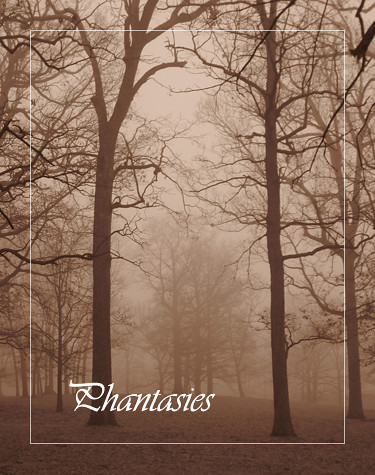
Volume XII, Issue XXIV
Phantasies
By George MacDonald, Chapter 18
In the wind's uproar, the sea's raging grim,
And the sighs that are born in him."
~ Heinrich Heine.
From dreams of bliss shall men awake
One day, but not to weep:
The dreams remain; they only break
The mirror of the sleep."
~ Jean Paul, Hesperus.
How I got through this dreary part of my travels, I do not know. I do not think I was upheld by the hope that any moment the light might break in upon me; for I scarcely thought about that. I went on with a dull endurance, varied by moments of uncontrollable sadness; for more and more the conviction grew upon me that I should never see the white lady again. It may seem strange that one with whom I had held so little communion should have so engrossed my thoughts; but benefits conferred awaken love in some minds, as surely as benefits received in others. Besides being delighted and proud that my songs had called the beautiful creature to life, the same fact caused me to feel a tenderness unspeakable for her, accompanied with a kind of feeling of property in her; for so the goblin Selfishness would reward the angel Love. When to all this is added, an overpowering sense of her beauty, and an unquestioning conviction that this was a true index to inward loveliness, it may be understood how it came to pass that my imagination filled my whole soul with the play of its own multitudinous colours and harmonies around the form which yet stood, a gracious marble radiance, in the midst of its white hall of phantasy. The time passed by unheeded; for my thoughts were busy. Perhaps this was also in part the cause of my needing no food, and never thinking how I should find any, during this subterraneous part of my travels. How long they endured I could not tell, for I had no means of measuring time; and when I looked back, there was such a discrepancy between the decisions of my imagination and my judgment, as to the length of time that had passed, that I was bewildered, and gave up all attempts to arrive at any conclusion on the point.
A gray mist continually gathered behind me. When I looked back towards the past, this mist was the medium through which my eyes had to strain for a vision of what had gone by; and the form of the white lady had receded into an unknown region. At length the country of rock began to close again around me, gradually and slowly narrowing, till I found myself walking in a gallery of rock once more, both sides of which I could touch with my outstretched hands. It narrowed yet, until I was forced to move carefully, in order to avoid striking against the projecting pieces of rock. The roof sank lower and lower, until I was compelled, first to stoop, and then to creep on my hands and knees. It recalled terrible dreams of childhood; but I was not much afraid, because I felt sure that this was my path, and my only hope of leaving Fairy Land, of which I was now almost weary.
At length, on getting past an abrupt turn in the passage, through which I had to force myself, I saw, a few yards ahead of me, the long-forgotten daylight shining through a small opening, to which the path, if path it could now be called, led me. With great difficulty I accomplished these last few yards, and came forth to the day. I stood on the shore of a wintry sea, with a wintry sun just a few feet above its horizon-edge. It was bare, and waste, and gray. Hundreds of hopeless waves rushed constantly shorewards, falling exhausted upon a beach of great loose stones, that seemed to stretch miles and miles in both directions. There was nothing for the eye but mingling shades of gray; nothing for the ear but the rush of the coming, the roar of the breaking, and the moan of the retreating wave. No rock lifted up a sheltering severity above the dreariness around; even that from which I had myself emerged rose scarcely a foot above the opening by which I had reached the dismal day, more dismal even than the tomb I had left. A cold, death-like wind swept across the shore, seeming to issue from a pale mouth of cloud upon the horizon. Sign of life was nowhere visible. I wandered over the stones, up and down the beach, a human imbodiment of the nature around me. The wind increased; its keen waves flowed through my soul; the foam rushed higher up the stones; a few dead stars began to gleam in the east; the sound of the waves grew louder and yet more despairing. A dark curtain of cloud was lifted up, and a pale blue rent shone between its foot and the edge of the sea, out from which rushed an icy storm of frozen wind, that tore the waters into spray as it passed, and flung the billows in raving heaps upon the desolate shore. I could bear it no longer.
I will not be tortured to death," I cried; "I will meet it half-way. The life within me is yet enough to bear me up to the face of Death, and then I die unconquered."
Before it had grown so dark, I had observed, though without any particular interest, that on one part of the shore a low platform of rock seemed to run out far into the midst of the breaking waters.
Towards this I now went, scrambling over smooth stones, to which scarce even a particle of sea-weed clung; and having found it, I got on it, and followed its direction, as near as I could guess, out into the tumbling chaos. I could hardly keep my feet against the wind and sea. The waves repeatedly all but swept me off my path; but I kept on my way, till I reached the end of the low promontory, which, in the fall of the waves, rose a good many feet above the surface, and, in their rise, was covered with their waters. I stood one moment and gazed into the heaving abyss beneath me; then plunged headlong into the mounting wave below. A blessing, like the kiss of a mother, seemed to alight on my soul; a calm, deeper than that which accompanies a hope deferred, bathed my spirit. I sank far into the waters, and sought not to return. I felt as if once more the great arms of the beech-tree were around me, soothing me after the miseries I had passed through, and telling me, like a little sick child, that I should be better to-morrow. The waters of themselves lifted me, as with loving arms, to the surface. I breathed again, but did not unclose my eyes. I would not look on the wintry sea, and the pitiless gray sky. Thus I floated, till something gently touched me. It was a little boat floating beside me. How it came there I could not tell; but it rose and sank on the waters, and kept touching me in its fall, as if with a human will to let me know that help was by me. It was a little gay-coloured boat, seemingly covered with glistering scales like those of a fish, all of brilliant rainbow hues. I scrambled into it, and lay down in the bottom, with a sense of exquisite repose.
Then I drew over me a rich, heavy, purple cloth that was beside me; and, lying still, knew, by the sound of the waters, that my little bark was fleeting rapidly onwards. Finding, however, none of that stormy motion which the sea had manifested when I beheld it from the shore, I opened my eyes; and, looking first up, saw above me the deep violet sky of a warm southern night; and then, lifting my head, saw that I was sailing fast upon a summer sea, in the last border of a southern twilight. The aureole of the sun yet shot the extreme faint tips of its longest rays above the horizon-waves, and withdrew them not. It was a perpetual twilight. The stars, great and earnest, like children's eyes, bent down lovingly towards the waters; and the reflected stars within seemed to float up, as if longing to meet their embraces. But when I looked down, a new wonder met my view. For, vaguely revealed beneath the wave, I floated above my whole Past. The fields of my childhood flitted by; the halls of my youthful labours; the streets of great cities where I had dwelt; and the assemblies of men and women wherein I had wearied myself seeking for rest. But so indistinct were the visions, that sometimes I thought I was sailing on a shallow sea, and that strange rocks and forests of sea-plants beguiled my eye, sufficiently to be transformed, by the magic of the phantasy, into well-known objects and regions. Yet, at times, a beloved form seemed to lie close beneath me in sleep; and the eyelids would tremble as if about to forsake the conscious eye; and the arms would heave upwards, as if in dreams they sought for a satisfying presence. But these motions might come only from the heaving of the waters between those forms and me. Soon I fell asleep, overcome with fatigue and delight. In dreams of unspeakable joy--of restored friendships; of revived embraces; of love which said it had never died; of faces that had vanished long ago, yet said with smiling lips that they knew nothing of the grave; of pardons implored, and granted with such bursting floods of love, that I was almost glad I had sinned--thus I passed through this wondrous twilight. I awoke with the feeling that I had been kissed and loved to my heart's content; and found that my boat was floating motionless by the grassy shore of a little island.
(to be continued)
Tree of Life
Photos by Bob Kirchman
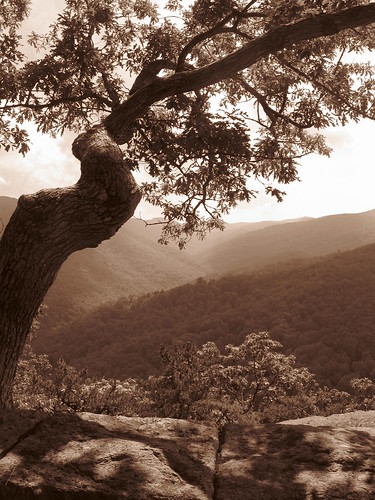
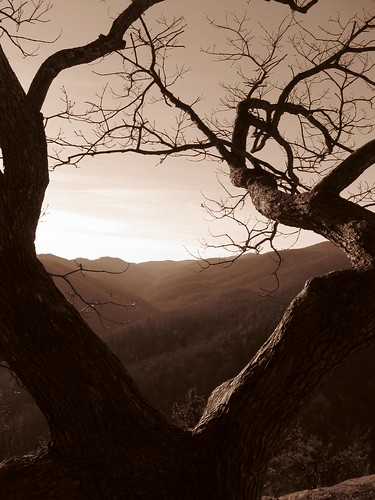
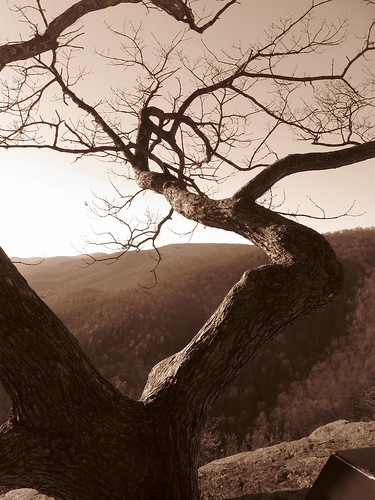
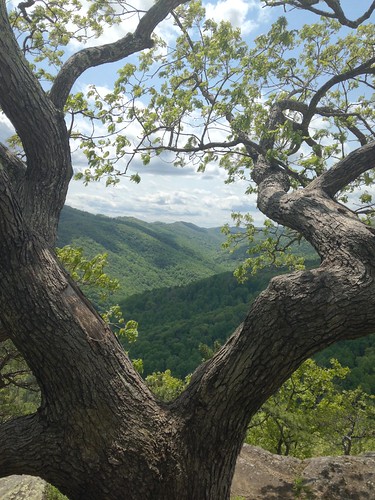
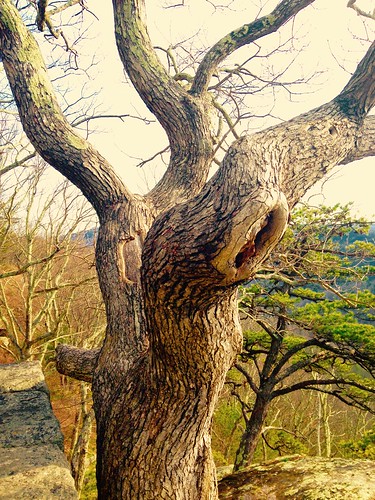
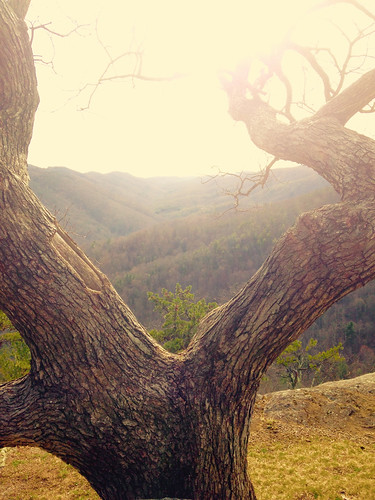
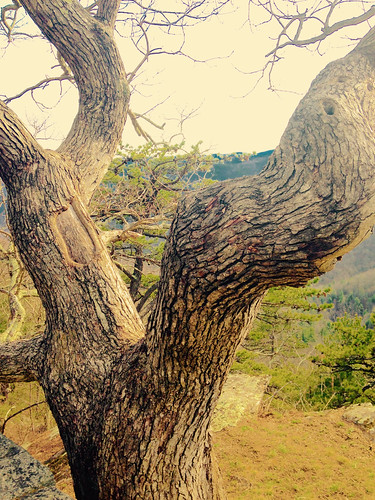
In just about every season, I have visited this venerable old tree at Twenty Minute Cliff Overlook on the Blue Ridge Parkway. It has become one of my favorite recurring subjects.
Photos by Bob Kirchman
Misty White Rock Falls
Photos by Bob Kirchman

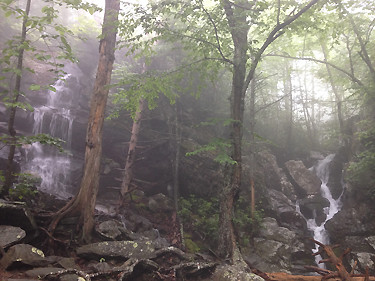


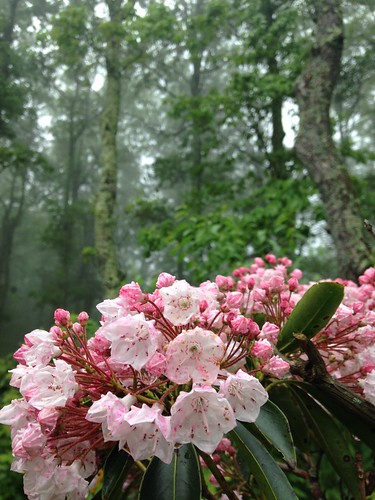
Just off of the Blue Ridge Parkway in Virginia there is a wonderland that is just a short hike away. We visited on a misty afternoon... exclaiming that it was almost like a trip to Narnia! The flowers and fog created a special wonder. We got caught in a torrential rain. It was Magical!
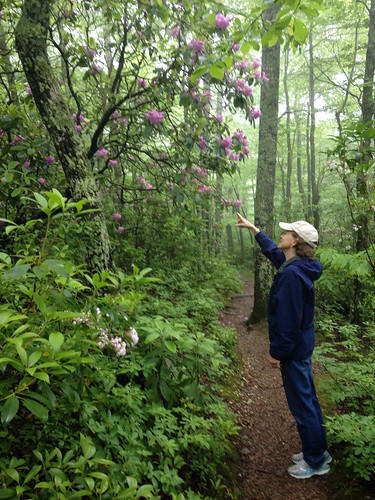
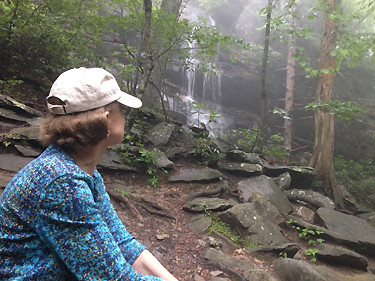
Feed Storage in Stuarts Draft
Photo by Bob Kirchman
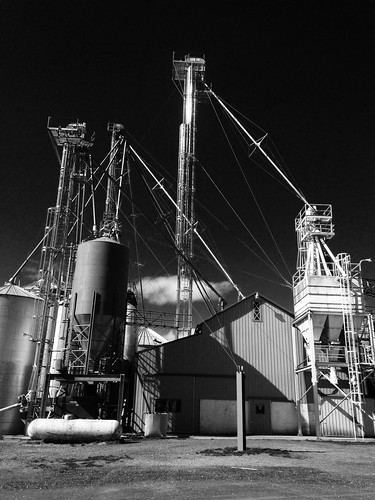
Feed storage at Sunshine Farms in Stuarts Draft, Virginia creates a pattern against the sky.
Richmond Dairy
Photos by Bob Kirchman
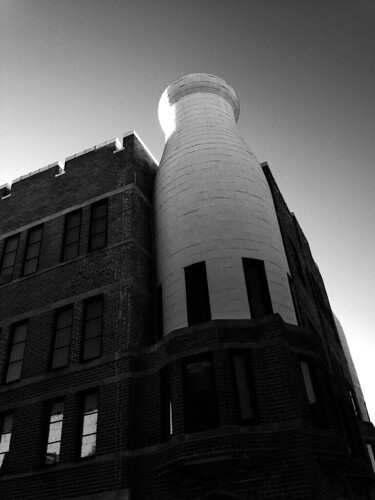
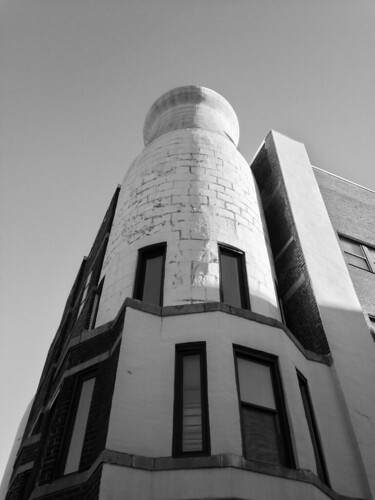
Built in 1914, the Richmond Dairy Building's iconic towers told passers by what went on inside.
In 1890 J.O. Scott, A.L. Scott and T.L. Blanton founded the Richmond Dairy Company. In those days before everyone had refrigerators, daily delivery of dairy products in sealed and sterilized glass bottles brought with it the guarantee of freshness. Prior to 1870 milk was delivered by dairymen from a pail.
When architects Carneal and Johnston designed the company’s signature building built in 1914, they incorporated the modern milk jug into the building’s imagery. At the time it symbolized a great advance in providing safe milk to the public and the new building celebrated it!
But in the 1930s Dupont began to mass produce Freon-12. Visitors to the 1939 World’s Fair saw modern refrigerators. They would not see them in their homes until after the great World War, but by 1950 the refrigerator was a standard appliance in the American kitchen. Milk delivery continued for the next two decades, mainly as a convenience.
By 1970, however, the company was closed as refrigeration had made home delivery a nice convenience that not so many consumers really needed anymore. Milk could come home with the other groceries and the box on the front porch disappeared along with the glass bottles which were now seen as more of an inconvenience.
The building languished in disrepair for the next decades but as Richmond, Virginia’s Jackson Ward became a popular place to live the old building found new life as apartments.
James Renwick Manship Adds:
13 May 2010 — The website EnvironmentalLeader.com recently praised Marks and Spencer for switching all of its mini wine bottles from glass to “environmentally-friendly” polyethylene terephthalate (PET) plastic in the UK market. Since when has PET plastic become more environmentally-friendly than glass? From an energy consumption point of view, plastic production uses marginally less energy than glass (2,013 BTUs for PET versus 2,155 BTUs for glass) and perhaps this is where plastic may appear more environmentally-friendly. But if you look at the total life cycle of one single bottle, plastic and glass, you realize that glass is significantly superior:
Glass containers can be cleaned and reused several times as part of consignment programs. We use milk from the company Harmony Organic (TM) which comes in a glass bottles that the company collects back, cleans and refills. PET bottles should not be reused as they deteriorate very quickly and can present increased health risks. Glass is highly recyclable, in fact it can be recycled eternally, because its structure does not deteriorate when reprocessed. Plastic bottles can only be recycled once. They can then simply be downcycled into an item that would not be used for food or drink such as fabric fibres for bags or clothes.
A Reconciler Remembered
A Deeper Look at Robert E. Lee
By R. David Cox
[click to read]
Genuine peace demanded prosperity, so Lee developed a curriculum aimed at attaining it: business, journalism, law, mining, engineering. To traditional classical studies he added English, modern history, and sciences. By 1868, his little college had become the second-largest academic institution in the South.” -- R. David Cox
All the statues of Robert E. Lee in Confederate uniform fail to convey one critical point: He was more than that. After Appomattox, Lee turned from being a leader in war to a leader of peace. As I found in examining his religious convictions, he became — largely because of his faith — the South’s preeminent exponent of reconciliation. That, I believe, is why he needs to be remembered, but in a different way. (read more)

Icy Japanese Maple
A Case for Vision V
In their book: The Poverty of Nations [click to read], Wayne Grudem and Barry Asmus describe what they call: "The amazing process of creating value that did not exist before." Using the example of a woman in a poor country who takes three dollars' worth of material and sews it into a shirt which she sells for thirteen dollars, the authors point out that she has created a new product of value. She has made that cloth ten dollars more valuable than when she bought it. She has also contributed ten dollars of value to the total value of everything her nation will produce that year, the GDP of that nation. In Zambia, at a place called Grippis Farm, people are learning to sew. They begin with plastic snack bags as they build their skills to the point where they can work with the actual valuable fabric. In fact, Grippis Farm, which receives support from people in American churches, is putting into practice what The Poverty of Nations preaches.
Grippis Farm provides education for the young people of the community. It supports sustainable advances in agriculture as well as incubating the fledgling sewing business. Angus Buchan, who fled Zambia for South Africa buring its previous period of political unrest, has created a similar community of opportunity of opportunity at Shalom Ministries. Asmus and Grudem point to examples in history of nations that have become prosperous by producing more goods and services. England during the Industrial Revolution invented machinery for efficiently weaving cotton thread, thus revolutionizing the clothing industry. "The principle product of the new technology that we know as the Industrial Revolution was cheap, washable cotton, and along with it mass-produced soap made of vegetable oils. For the first time, the common man could wear underwear, once known as body linen because that was the washable fabric that the well-to-do wore next to their skin... Personal hygiene changed drastically, so that commoners of the late Nineteenth and early Twentieth Century often lived cleaner than kings and queens of a century earlier.
By producing immense amounts of cotton and then other desirable products (such as high quality steel and machinery), England became the world's wealthiest nation. Income per person in England doubled between 1780 and 1860, then between 1860 and 1990 it multiplied another six times!" -- David S. Landes, The Wealth and Poverty of Nations, (New York, W. W. Norton, 1999), 154, 190-94. [1.] The authors go on to cite post World War II Japan and modern China as having become similar productive societies. The Congressional Office of Management and Budget has just released projections showing massive shrinking of America's employment resulting from the so-called "Affordable Care Act's" implementation. [2.] That is on top of an already documented decline that began around 2007. Employment percentages often hide the fact that many employable people have given up and are no longer counted. Employment as a percentage of actual population in the United States has reached a new and dismal all-time low.
A spokesman of the former President's decree that: "now more Americans are no longer tied to a full-time job and are free to pursue their dreams." rings hollow. Most creative ventures in following dreams, after all, began as night and weekend enterprises begun by people in regular jobs. My own venture into enterprenuership began over thirty years ago. I was frustrated in a position where my creativity was dismissed and their was no prospect of growth in career stature or compensation. My best designs often ended up on the cutting room floor, so to speak, as the man I worked for desired quick and dirty... and made that fact very clear. He was a good man, but saw no need for vision when what worked twenty years ago would, he surmised, serve quite adequately. I began with my little studio in a spare bedroom. I would pick up my assignments before and after work, and often missed lunch to meet with clients. I would do the actual work in the evening. My little daughter was a baby and often I would share a tender moment with my beautiful wife at the 2:00am feeding!
I gave my employer a month's notice. I thought he would like for me to train my replacement. No one ever showed up to shadow me; Instead, I remember the afternoon I was taken to a very nice lunch by my bosses who proceeded to tell me that I would most certainly fail at my new venture. I should stay where I was! That I "failed" for thirty years at it I do wear as a badge of honor. I have had a handful of brilliant young people share with me in the process of learning the art of visualization. That has been the greatest honor I have received in the process. I once won a PIVA award for one of my brochure designs for a major development company and they misspelled my name! I think of the young people like my last assistant who mostly taught themselves while in my company, and I feel that having somehow enabled their greatness to shine is my most fulfilling reward! These are the honors that gather no dust sitting on your sideboard.
So, we must ask ourselves: "What are we bequeathing to these brilliant young souls?" My nephew works in Baltimore at the sugar refinery. He sent me an article not long ago talking about how they were tearing down the Sparrow's Point Steel Mill and selling the demolished machinery for scrap value. Management saw the need to create one last bit of profit by making men who had lovingly maintained these machines and used them to make a living now tear them apart and sort them into scrap bins! One man saw some sander disks and though they were industrial quality, they would fit on his home sander. He asked his immediate supervisor if he could have them. When his supervisor agreed he threw them in the open bed of his pickup only to be fired by a higher-up manager later that day for stealing company property! The man did not steal the disks, he asked first. Most of us will read this and see the higher law that should govern, but the manager only saw what should have been added to the gross tonnage of scrap 'misdirected' to an employee's vehicle.[3.]
If one looks at the percentage of growth in private employment compared to government employment, the picture is bleak.[4.] Government does not produce, it can only tax and procure. Furthermore, look at communities that have been "freed from work" and subsist on government programs. Are they hotbeds of entrepreneurship (other than the drug trade)? A friend of mine shared with me a video about an inner city ministry in Brooklyn, New York. They did home visits and you see disturbing footage inside a dirty, roach infested apartment. A young child still plays but an older sibling stares vacantly from a couch. There are no dreams here to be pursued! Generations have known nothing but government dependency. Is this the vision some of our so-called 'leaders' have for our great nation?[5.] More and more Americans are on food stamps now. But here, amid the bleakness, one finally sees the hope. While most states have lackluster private employment growth or outright decline, South Dakota stands out like a bright beacon. Though the last administration has done everything to stifle domestic energy production on public lands and the Keystone Pipeline, PRIVATE lands have never been busier. The Dakotas and parts of Texas as well have become boom economies. You can go there and sign on with an oil company and soon be making a six-figure salary. Workers are so desired that you can make seventeen dollars an hour at Wal Mart! The point is that in this one sector of the country there are workers creating value that wasn't there before... and they are being rewarded for it.
